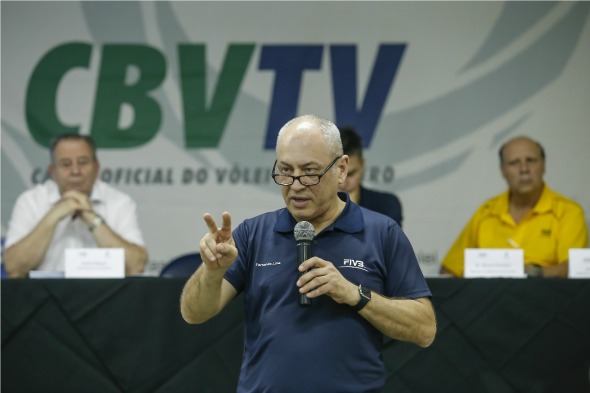EXCLUSIVE: Volleyball Must Improve on Fan Engagement and Entertainment at Olympics – FIVB Secretary General
August 21, 2016
By Christian Radnedge in Rio
The secretary general of the International Volleyball Federation (FIVB) has told iSportconnect that if the sport is to continue to grow following Rio 2016, recipe it must improve on fan engagement.
Fernando Lima was speaking to iSportconnect as both the beach volleyball and volleyball tournaments were building to their climactic finals at the Games in Rio.
Beach volleyball has been one of the standout events at Rio 2016, with the games being played on the stunning setting of Copacabana beach.
But even with the “best ever beach volleyball venue” as FIVB insiders have described it, Lima was concerned that there were still lessons to be learned on how to keep the spectators involved with the game’s action.
“I think the Rio competition so far has been a very important learning experience,” Lima told iSportconnect. “We have been learning with entertainment adjustments and so on, so there are many things that we are observing here and making notes and that I believe we will be able to practice in our own events all the way through to Tokyo [2020 Olympics].
“I think the general expectation in Tokyo is that we will have a fantastic Games in terms of we already have a high level sport, high entertainment and technology. So I think this combination will be essential.
“But the goal for our sport, and I think that should be the goal for any sport, is that the ways we connect with fans should be… to have those fans engaged not only as ‘coach potato fans’, to watch the game only, but you want them to be able to understand the game and we want them to be able to participate somehow, to be able to practice our sport, to really go into the mainstream of sports activity.”

Entertainment factor
The volleyball competitions certainly mark a difference to their Olympic counterparts, in terms of having entertainment a big part of the game experience. Every time there is a break in play, of which there are admittedly many, loud music blares out, coloured lights shine and the announcer encourages the crowd to imitate the moves just seen on the court or just to make noise of either of the teams playing.
This level of activity plays well with a lively South American crowd. Indeed, volleyball and beach volleyball were some of the most subscribed sessions when tickets initially went on sale. The finals for both competitions sold out very early on.
The FIVB will debate the success of the Rio competition at its congress in October in Buenos Aires, Argentina, and Lima explained how the entertainment factor of the sport has been judged over the past two weeks.
He said: “To use a hundred and eighty breaks, trying to have the fans reacting to all those stimuli that we are creating is a big challenge. This is what we are saying to our entertainment guys: you have one way to be measured, every time you do something and the people react in the way I have mentioned, you score a positive point. If people don’t react you score a negative.
“In the end we have a score to measure the efficiency of what we are doing. But this is good, this is a way to measure if what we are delivering to the public is successful or not.”

Technology in Tokyo
Any learnings from Rio will be taken on board for upcoming events in the FIVB calendar, including the beach volleyball World Tour Finals in Canada, sponsored by Swatch, next month and the volleyball women’s Club World Championship in the Philippines and the men’s edition in Brazil, both taking place in October.
Plans for Tokyo 2020 Olympics are already gathering pace though with Lima expressing his satisfaction with how prepared the organizing committee is so far with the vision for volleyball and beach volleyball in four years’ time.
Tokyo 2020 plans to host volleyball at the due to be constructed Ariake Arena, while beach volleyball will take place in a temporary venue in Shiozake Park.
“I would say that Tokyo is at this stage really well advanced because we have had a reasonable amount of meetings already both in Tokyo and in Lausanne. They already have the plans for the venue, they have plans for traffic for fans, circulation around the venues. So their planning has been really good so far.
“Our experience in Japan is that the delivery usually corresponds to the plan so we’re really pleased to have at this stage a very detailed planning for the Games in Tokyo.”
By the time the Games are staged in Tokyo, 8K or Super Hi-Vision will have built on its already rapid growth in Japan with national broadcaster NHK having stated they want to broadcast the 2020 Games live on a new 8K TV channel. Test broadcasts will apparently begin in 2018 just before that year’s Winter Olympics in Pyeongchang, South Korea.
Virtual reality
The FIVB is embracing 360-degree video, with guests at Volleyball House on Copacabana able to try out the technology and experience the virtual reality of a “live” game.
Should the technology be more prevalent in 2020 as predicted by tech experts, the FIVB may be able to increase fan engagement and interaction to those watching at home as well as those sitting in the stands.


